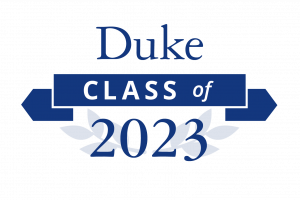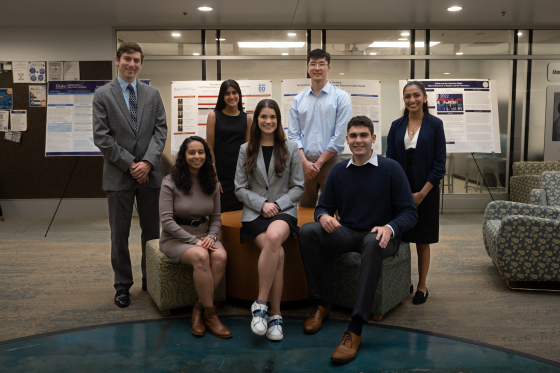Shaun King, Trinity Communications


Ritika Saligram can be heard across campus and beyond, as a senior studying Political Science, History and Markets & Management Studies. Saligram helped plan an educational trip to Pearl Harbor for more than 30 Duke student and alumni in her role as co-chair of the Duke Program in American Grand Strategy. She is president of Duke’s oldest, most award-winning female acappella group, Out of the Blue. Her interests include security and conflict studies in Asia, European history, space diplomacy and opera. After graduation, Saligram will be based out of Dallas working in risk management for Goldman Sachs. Her professional experience includes political risk analysis and financial risk management.
We sat down with Saligram two weeks before her graduation to hear more about the wide interests she has explored at Duke.
Why did you decide to major in political science?
I was totally hooked on poli sci after taking Intro to International Relations, taught by Professor Peter Feaver. I chose to do that instead of public policy because I found the theory aspect of foreign affairs really interesting.
What subjects and courses at Duke have helped charter your upcoming career focus?
Freshman year I took a course called political risk analysis with Professor Eddy Malesky. Risk as a subject has always been fascinating to me because I like to push my boundaries but I’m naturally quite conservative about the things I’m willing to put myself through. That course opened my eyes to the intersection of business, policy and international development. Global companies are now thinking profoundly about new markets and risks beyond the financial ones . Risk analysis through this lens seems like an important value in a globalized world. Now as a senior, I’m a teaching assistant for that same course in political risk analysis that I signed up for as a freshman and I’m revisiting all those ideas, which is exciting.
What kind of academic challenges have you embraced at Duke that came with some risk?
It took a lot of work and effort to be co-chair of the American Grand Strategy student council. I think another proud but challenging moment was finishing my honors thesis. I started the project with no background knowledge on my topic whatsoever. There were definitely some tough moments, even just in terms of stamina for the nine month-long project. I had to immerse myself in something new while dealing with my other school work.
What form of self-expression have you been practicing at Duke?
Acapella at Duke was an opportunity for me to exercise a creative muscle. It was new for me, but I grew into a tight knit community with the women of Out of the Blue. Singing was a really dangerous activity during the pandemic, but luckily we received approval from Duke to sing outdoors under specific conditions. Singing in a group has been cathartic and healing for me over the last 4 years. Our group also celebrates seniors with a special performance and a solo opportunity, so I’ve been excited about this performance for a long time!
What advice do you have for students who are on an earlier part of a similar path at Duke?
I made some difficult choices in my junior year. It was a time of uncertainty, not just because of the pandemic, but also because I was unsure about my thesis topic, and unsure if I could do the math and analysis, unsure what I wanted out of my last ‘normal’ year at Duke. I had to choose whether to take on a project that would define my entire year. I think that for any student who is considering writing an honors thesis, know that it will be difficult, but it is really worth it in the end.

I also think that for any student who idealizes the senior year as the year of fun and the year of celebration, know that it is also daunting to be on the job market and to start figuring out who you want to become in concrete terms. It was tough for me to admit that this year was going to be so challenging, but the earlier I came to terms with it, the happier I became.
I must also say that the libraries are a fantastic resource. The research librarians really want to help students and not enough students reach out to them. I would say I am an independent thinker and was at first reluctant to reach out to librarians or professors during their office hours, but changing my mindset about that made an incredible difference to the work that I produced and the relationships I made.